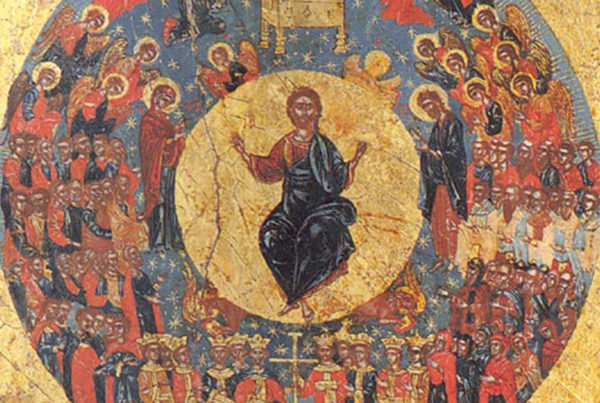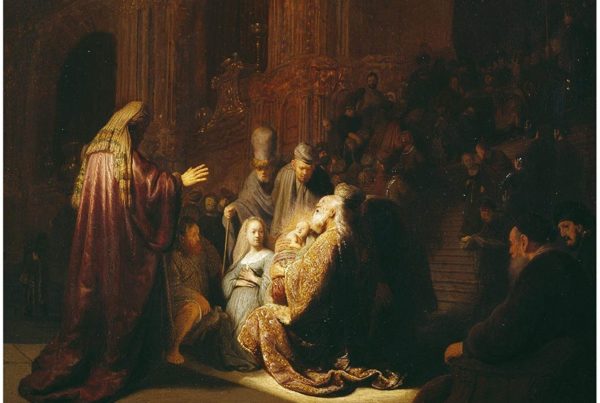I was sitting in the coffee shop two weeks ago discussing an upcoming sermon with my friend Joe, a rabbi with whom I regularly meet to compare notes on the Bible and the mystery of being human. Joe is a delight, and our conversations always leave me better.
This particular afternoon, our subject matter was the first chapter of the book of Ruth. That good woman Naomi, whose name means “pleasant”, returns to her hometown, Bethlehem, after a long absence. The years had reduced her to almost nothing. Driven from Bethlehem to the forbidding land of Moab by a famine, Naomi subsequently lost both her husband and her two sons. She returns to Bethlehem with the fragments of a once-prosperous life.
The townspeople are abuzz at the news of her return. In his commentary on Ruth, Robert Hubbard remarks that in all likelihood, Naomi and her deceased husband Elimelech (no small irony here – his name means “my God is king”) had been a well-known, aristocratic family. The Rockefellers are back in town, friends. Except, not as we remember them. And Naomi is keen to make sure all of Bethlehem knows how it now stands with her:
20 “Don’t call me Naomi,” she told them. “Call me Mara, because the Almighty has made my life very bitter. 21 I went away full, but the Lord has brought me back empty. Why call me Naomi? The Lord has afflicted me; the Almighty has brought misfortune upon me.”
Mara means “bitter”, and my thoughts that afternoon were circling around Naomi’s bitter words. Without blushing or any sign of embarrassment, she attributes her misfortune to God.
God made my life bitter.
God brought me back empty.
God afflicted me.
God brought misfortune upon me.
She apparently feels, as many of us doubtless would, no obligation to protect God’s reputation with pious jargon. He is God. Let him defend his reputation, if he cares to. We would do well, I said to Joe, to be that honest about God; that honest with God.
Joe agreed (it is always a good day when a rabbi agrees with your take on Scripture), and then pointed out something in the Hebrew text that I had not seen. Twice Naomi refers to God as “the Almighty.” The Hebrew is “Shaddai”–Almighty–which is a departure from the more regular “El Shaddai”–God Almighty. His remark was trenchant, and it has lingered with me ever since:
Something of God died in her experience.
Where pleasant Naomi had once known the gracious hand of a loving God, now she knows him only as a brute and absolute Power. I am tempted to call it an “indifferent” power–like a tornado or a hurricane–but that would betray Naomi. She doesn’t see him as an “indifferent” power. She sees Shaddai as a cruel Power. And she says as much. Gracious God didn’t just “allow” this. God did this. To me.
Linger for a moment here. I think this is the way it is with us, friends. Circumstance has a way of doing that to us. We lose a job, a friend, a loved one; we watch our best efforts explode and our dreams miscarry; we stand by helplessly as a once-composed and happy marriage spins wildly out of control, and it is not just that we are reduced to ash. All too often, and perhaps more existentially threatening: our idea of God is reduced to ash as well.
I am struck by the fact that Naomi, along with every other biblical character who suffered and shook their fist at heaven in their suffering, is not rebuked. All to the contrary, the shrill denunciations are welcomed, even blessed. Almighty God is not put out by our bitter invective; he will not silence our cries. Our anger and tears are holy.
And there is more, at least as I spy it. Though at the edges of her diatribe she decries God as the brute Power who has reduced her life to ash, yet at the heart of it she names the ancient Name, twice having the courage to call God “Yahweh”–the God revealed in the Exodus as the One whose Name is bound up with the fate of an oppressed and beleaguered people; indeed, whose Name is bound with the face even of bereft, out-of-the-way widows like Naomi. She places her fate in his steady hands. No, even more–she claims that her fate is already-always in his hands. In the absolute darkness of her experience, the embers of faith still glow.
Yes, God does “die” in our experience. And we need not be embarrassed by it. It has happened to you. It has happened to me. It will happen again to you and to me. Many times over. Our ideas of God will break upon the hard rock of circumstance and die bitter and cruel deaths.
And.
God lives. And his promise remains. And he will–maybe soon, maybe late–show himself to be the God who lives and lives and lives, who tirelessly and ceaselessly lives, for us and with us, beyond his “death” and ours, now and forever.
Which, of course, is what we say when we declare the mystery of our faith:
Christ has died.
Christ is risen.
Christ will come again.
Amen.



